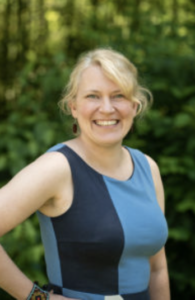by Eric Olson-Getty, Director of Programs
Sometime in the last two years, as the COVID-19 pandemic has swept over the world again and again, you may have read or heard that health care workers sometimes refer to themselves as the “last line of defense” against the virus. This is in contrast to our more normal perception of nurses as being on the “front lines,” which naturally arises from the fact that they have the most direct contact with acutely ill patients. When a health care worker correctively tells us that they are, in fact, the “last line,” they mean that they only encounter a COVID patient after all other preventive measures have failed to prevent infection. It is a charge to the rest of us, who live upstream from the hospitals and clinics, to take appropriate measures to minimize the likelihood that we’ll become someone’s patient.

For Katie Huffling, Director of the Alliance of Nurses for Healthy Environments (ANHE), the same principle applies in any public health crisis. Katie’s background is as a nurse midwife, and for several years she worked in the “last line” in a hospital outside Washington, D.C. The practice served a patient population that was predominantly low-income people of color, many of whom were undocumented and uninsured. A large percentage of her patients were exposed to toxins in their environment as a matter of course in their daily lives, and that had negative health impacts on pregnancy and childhood development.
Katie wanted to do more than treat patients who were already sick and experiencing poor outcomes. She wanted to address the underlying environmental conditions that were turning people into patients in the first place, so she joined with like-minded nurses from across the US to launch ANHE in 2008. The practitioners she works with are people who wanted to do systemic environmental work, but found themselves isolated in silos that limited their impact. ANHE provides groups with a network, leveraging funding to make collective efforts that ensure the voice of nurses are at the center of environmental policy debates and research.
Before the pandemic put an end to in-person contacts Katie spent a lot of time in D.C. doing coalition-building work, work that has become long hours on Zoom. Those efforts have made a difference. Recently the state of Maryland passed a ban on fracking, an accomplishment that ANHE shared with coalition partners. “I broke down in tears when they announced the news,” Katie says.
Katie says that the future promises to be intense with the climate crisis forcing communities to make transitions to a new economy. “We have to hold our regulatory system accountable, because there is always a tension between industries wanting to push the limits and the need to put community health first,” she says.
ANHE relies largely on foundation grants, but that often limits the scope of issues they can work on. For example, Katie says, “we would love to do more work on clean water, as well as food and agriculture and toxic chemicals.” These are issues ANHE sees as critical public health risks, but there is currently little funding available to address them. In practice, funders who are heavily focused on climate issues do not regard these as climate-related.
Looking to the future, Katie hopes to see more funds become available to build a broader systemic response to the many environmental challenges that negatively impact communities. In the meantime, she reminds us that it is critical that people in this work support each other and take care of ourselves. “We need to model a culture of taking time for yourself to recharge.” That is a reminder to all of us who are working long hours to build a better world: the personal is political, so we can’t heal the world without tending to our own healing.




